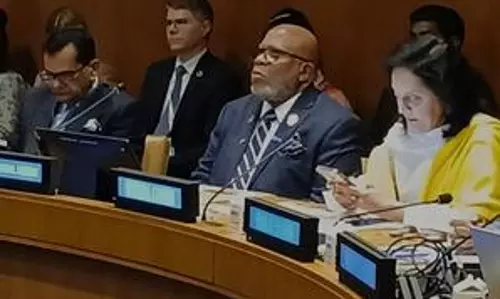
Morality out of law's domain
text_fieldsThe concepts of the ruler (bharthav in Malayalam) and the ruled (bhaarya) reflect a tradition and a mentality. Now the Supreme Court has rejected this conception and emphasized that a husband is not a master over the wife, that man and woman have equal rights and that any discrimination between them is unconstitutional.
The court has tried to define the relations between husband and wife on the basis of freedom and dignity. The apex court through its historic judgement thus struck down the provision in Sec 497 of Indian Penal Code, that defines adultery as a crime. The judgment of the five-member bench was unanimous. The said provision of Section 497 had declared a wife's sexual intercourse with another man without husband's permission, a crime.
The court pointed out that the existing law saw woman as a 'property' of the husband. Although the extra-marital relations will continue to be a reason for divorce, the heart of the verdict is that such relations will no longer constitute a criminal act. At the same time, if this becomes a cause of suicide by the spouse, it will be treated as an abetment for divorce. The Supreme Court assessed Sec 497 of IPC as in violation of Articles 14, 15 and 21 of the Constitution that guarantee equality, freedom from discrimination, and life with dignity.
Also struck down was the provision in Criminal Procedure Code (CrPC) Section 198(2) that gives freedom to complain about extra-marital relations to the husband or the person authorised by the huaband. In effect, the wife's right to file a case against an adulterous husband has ceased to exist. It is all too clear that such laws belong to a male-dominated era and do not have any relevance today.
At the same time, the Supreme Court judgement does raise some questions. The petition filed by Shine Joseph, from Kozhikode, was more about the male-female discrimination in the name of adultery, than about extra-marital relations itself. There is punishment meted out to man for adultery, but not for woman. The law was questioned as basis for punishing only one side, even whenthe crime is committed by mutual consent. But whether adultery itself is criminal is a question that needs more detailed discussion and study.
The Central Government argued that in adulterous relations, not only man but woman also should be punished. The government also highlighted the importance and sanctity of marital relations. Therefore, the contention was for retaining the provision that maintains the punishment which upholds the sanctity of marriage, and for making that punishment gender-neutral. This was not accepted by the court which observed that with the loss of the morality of matrimonial relations, its sanctity will cease to exist. Even as we accept this, the question that comes up is: the court's role was to examine the unconstitutionality of the existing provision; then, will determining whether adultery will be crime or not, turn out to be making another law? If yes, should it not have been done with a larger debate of parliament and the society?
In any case, given the limitations of our legislative and justice delivery systems, the judgment does not make surprise. When individual rights become supreme and permissiveness that is next door to anarchy is deemed progressive, what assumes significance is the moral dimension of family and social relations. The individual's freedom is his/her obligation too. When morality is expelled from legal codes, when moral values cease to be protected through law, it is the individual's mind - which determines his acts - that needs to be armed. When the mind is strengthened with morality, it can cleanse itself and maintain matrimony as sacred. The onus of preserving morality is more on religious values and faith, than law. It is the individual that fears god and conscience, rather than law that punishes, that will attain true freedom and dignity.






















